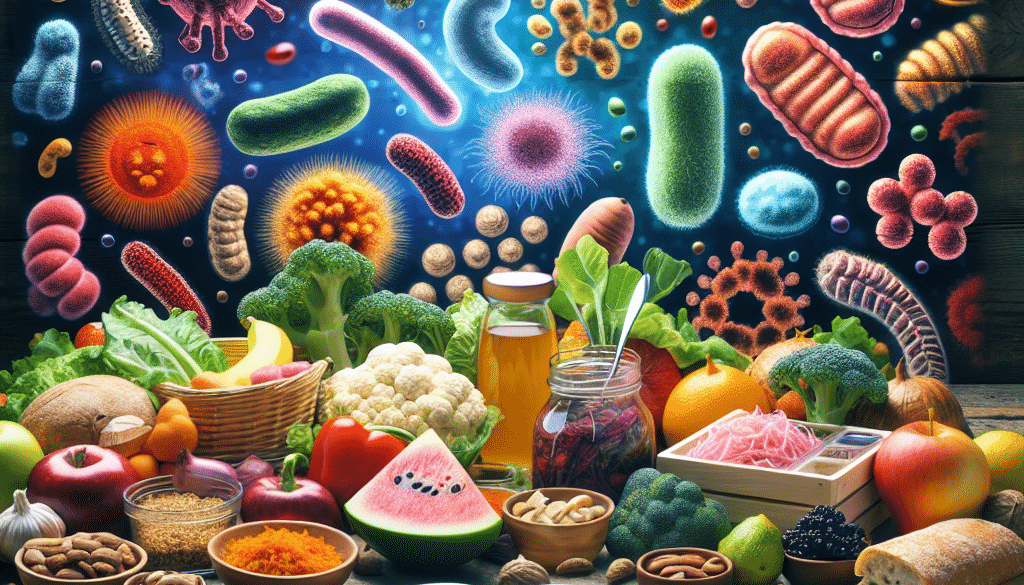Eating for a Healthy Microbiome
-
Table of Contents
- Eating for a Healthy Microbiome: Nourish Your Gut Flora
- Understanding the Microbiome
- The Impact of Diet on the Microbiome
- Key Dietary Strategies for a Healthy Microbiome
- Examples and Case Studies
- Statistics Supporting a Microbiome-Friendly Diet
- Conclusion: The Path to a Healthier Microbiome
- Enhance Your Microbiome with ETprotein’s Quality Protein Products
Eating for a Healthy Microbiome: Nourish Your Gut Flora

The human microbiome, particularly the gut microbiome, has become a hot topic in health and wellness circles. This complex community of microorganisms living in our digestive tracts plays a crucial role in our overall health, influencing digestion, immunity, and even mental health. Understanding how to nourish this microscopic ecosystem is essential for maintaining a healthy body and mind. In this article, we’ll explore the importance of a healthy microbiome and how diet can support this vital aspect of our well-being.
Understanding the Microbiome
The human microbiome consists of trillions of bacteria, viruses, fungi, and other microorganisms that inhabit various parts of our body, such as the skin, mouth, and gut. The gut microbiome, in particular, is incredibly diverse and contains over a thousand different species of bacteria. These microorganisms perform a myriad of functions, from breaking down food and absorbing nutrients to protecting against pathogens and regulating the immune system.
The Impact of Diet on the Microbiome
What we eat significantly impacts the composition and health of our microbiome. A diet rich in diverse, nutrient-dense foods can promote a more varied and resilient microbial community, while a diet high in processed foods and sugars can lead to an imbalance, known as dysbiosis, which can contribute to a range of health issues.
Key Dietary Strategies for a Healthy Microbiome
To support a healthy microbiome, consider incorporating the following dietary strategies:
- Fiber-Rich Foods: Dietary fiber, found in fruits, vegetables, legumes, and whole grains, is a primary food source for beneficial gut bacteria. These microbes ferment fiber, producing short-chain fatty acids that have anti-inflammatory effects and support gut health.
- Probiotic Foods: Probiotics are live bacteria found in fermented foods like yogurt, kefir, sauerkraut, and kimchi. They can help replenish and diversify the gut microbiota.
- Prebiotic Foods: Prebiotics are compounds that feed beneficial bacteria. Foods rich in prebiotics include garlic, onions, leeks, asparagus, and bananas.
- Polyphenol-Rich Foods: Polyphenols are plant compounds with antioxidant properties found in foods like berries, nuts, seeds, olive oil, and green tea. They can promote the growth of beneficial bacteria while inhibiting harmful ones.
- Diverse Diet: Eating a wide variety of foods can lead to a more diverse microbiome, which is associated with better health outcomes.
Examples and Case Studies
Research has shown that dietary changes can rapidly alter the gut microbiome. For instance, one study found that switching from a high-fat, low-fiber Western diet to a plant-based diet rich in fiber increased the diversity of gut microbes and the production of beneficial short-chain fatty acids.
Another case study involved the traditional diets of rural African children compared to European children. The African diet, high in fiber from plant sources, was associated with a more diverse microbiome and a lower incidence of gut inflammation and diseases like ulcerative colitis and Crohn’s disease.
Statistics Supporting a Microbiome-Friendly Diet
Statistics from various studies highlight the importance of a healthy microbiome:
- A diverse microbiome is linked to a 20-30% lower risk of developing obesity and type 2 diabetes.
- Diets high in fiber can increase the abundance of beneficial bacteria by up to 10 times.
- Consuming fermented foods regularly can lead to an increase in microbiome diversity and a decrease in inflammatory markers.
Conclusion: The Path to a Healthier Microbiome
In conclusion, the foods we eat play a pivotal role in shaping our gut microbiome. By focusing on a diet rich in fiber, probiotics, prebiotics, and polyphenols, and by embracing dietary diversity, we can foster a healthier, more balanced microbial community. This, in turn, can lead to improved digestion, enhanced immune function, and a reduced risk of chronic diseases. Remember, a happy gut is a cornerstone of overall health, so make mindful choices to nourish your microbiome every day.
Enhance Your Microbiome with ETprotein’s Quality Protein Products
ETprotein offers a range of high-quality protein products that can complement a microbiome-friendly diet. Their organic plant-based proteins, such as rice protein, pea protein, and various seed proteins, provide excellent sources of amino acids without the allergens and GMOs found in some animal-based proteins. Incorporating these proteins into your diet can support gut health by contributing to the maintenance of the gut lining and providing the building blocks for enzymes that aid digestion.
About ETprotein:
ETprotein, a reputable protein and L-(+)-Ergothioneine (EGT) Chinese factory manufacturer and supplier, is renowned for producing, stocking, exporting, and delivering the highest quality organic bulk vegan proteins and L-(+)-Ergothioneine. They include Organic rice protein, clear rice protein, pea protein, clear pea protein, watermelon seed protein, pumpkin seed protein, sunflower seed protein, mung bean protein, peanut protein, and L-(+)-Ergothioneine EGT Pharmaceutical grade, L-(+)-Ergothioneine EGT food grade, L-(+)-Ergothioneine EGT cosmetic grade, L-(+)-Ergothioneine EGT reference grade and L-(+)-Ergothioneine EGT standard. Their offerings, characterized by a neutral taste, non-GMO, allergen-free attributes, with L-(+)-Ergothioneine purity over 98%, 99%, cater to a diverse range of industries. They serve nutraceutical, pharmaceutical, cosmeceutical, veterinary, as well as food and beverage finished product distributors, traders, and manufacturers across Europe, USA, Canada, Australia, Thailand, Japan, Korea, Brazil, and Chile, among others.
ETprotein specialization includes exporting and delivering tailor-made protein powder and finished nutritional supplements. Their extensive product range covers sectors like Food and Beverage, Sports Nutrition, Weight Management, Dietary Supplements, Health and Wellness Products, and Infant Formula, ensuring comprehensive solutions to meet all your protein needs.
As a trusted company by leading global food and beverage brands and Fortune 500 companies, ETprotein reinforces China’s reputation in the global arena. For more information or to sample their products, please contact them and email sales(at)ETprotein.com today.












